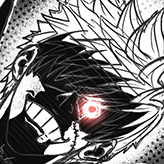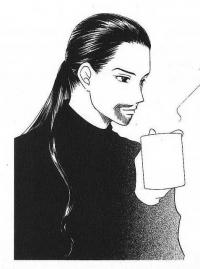Please discuss Bleak here! I would love yo hear your thoughts!
#1

 Posted 03 June 2014 - 01:40 AM
Posted 03 June 2014 - 01:40 AM

#2

 Posted 05 February 2015 - 08:36 AM
Posted 05 February 2015 - 08:36 AM

Mostly in ch. 1, there's some discussion of masks. It's something I thought about a lot for some years, although it's been a long time . . . perhaps because I came to some successful, for me, resolution of questions around them, perhaps because my social situation became more stable, with a love life and friends that I can trust, and so I didn't need masks that were as . . . pronounced, noticeable. Still there no doubt, but not an issue.
One of the things I concluded was that ultimately, you can't get away from masks in some degree, at least not once you become thoughtful enough about yourself to be self-conscious. But that doesn't have to be entirely a bad thing; you can't renounce them, but you can make use of them. That is, you can think about what masks you want to use, and about who you want to be, and try to use masks that incorporate your ideals about what kind of a person you want to become. It's my opinion that, as long as the dissonance isn't too great, the masks you choose kind of rub off on you, and you to some extent become who you choose to act as.
Mind you, while ultimately if you have any self-awareness or introspection, there is going to be some difference between your inner thoughts and how you present yourself--even basic politeness is to some extent a mask--and there are going to be differences in how you act around different people which reflect, at a minimum, showcasing different parts/aspects of yourself, it's still I think not wise to let it get too far off. What you show has to be a version of yourself that you recognize, that has your goals, your needs, pretty much your interests, some recognizable version of your style. Otherwise the mask you put on will be pursuing things that leave you unsatisfied and alienated. And also, that effect of your mask rubbing off on you will, if you pick a mask that is negative or cuts against your basic nature, actively turn you into a worse person or a person driven by internal conflicts and contradictions.
Our society is such that a lot of people are pushed towards using masks that damage them. So much of what we are expected to do is banal, useless or counterproductive. How do we take pride, feel fulfilled, when we're busily pretending that pursuing the basically negative things society insists we pursue, is what we want? This takes me out of the realm of the inner, psychological self and into social, political issues. Ultimately, after a lot of thought and reading which didn't really start from this line of thought but sort of converged to it, I've come to think that this problem is related to what Marxists would call "alienation", and that surprisingly a lot of the trouble is our regimented and selfish economic form. It's, and I know this may sound silly, capitalism's fault. We have to be what we're worth on the market, we have to define ourselves by what we do, or will do in the future, for wages at someone's command. The bleak future of pointless job doing nothing of worth until he dies that Af fears but doesn't see how he can avoid is an artifact of how our society is structured. It seems as if he's afraid of being "normal", of being one of the herd, but it's not that he wants to be a big boss or something, it's that what has become "normal" for us has nothing to offer that feeds the spirit. I don't think you have to be a star to be fulfilled; if ordinary work were a more co-operative endeavour where everyone had a stake, everyone had some control over what they did, and people could feel some confidence that what they were doing was actually useful, constructive, then even a small, "ordinary" role would be something you could take pride in.
I personally am lucky in that, working at a university library, I can feel like the job has some intrinsic merit and isn't ruled by profit. Not that I believe in being defined by my job, and it's still in a setup defined by hierarchy and bosses, but at least it's not something that's actively deadening my self.
Edited by Purple Library Guy, 05 February 2015 - 08:39 AM.
- A.I. likes this
#3

 Posted 05 February 2015 - 09:07 AM
Posted 05 February 2015 - 09:07 AM

Thanks for the big analysis loved reading it! I could answer some of the stuff you talked about but I think I will let the story explain itself! Hope that's alright! One thing you defined pretty well though:AF is afraid of being normal. He doesn't even know how to be normal to begin with, but also is afraid to be too abnormal, and that causes him to feel stuck in a circle of alienation and insatisfaction. AF is pretty much afraid of growing up and how he will grow up or even if he can grow up, that's the essence of this story even if mixed with a lot of other things!Mostly in ch. 1, there's some discussion of masks. It's something I thought about a lot for some years, although it's been a long time . . . perhaps because I came to some successful, for me, resolution of questions around them, perhaps because my social situation became more stable, with a love life and friends that I can trust, and so I didn't need masks that were as . . . pronounced, noticeable. Still there no doubt, but not an issue.
One of the things I concluded was that ultimately, you can't get away from masks in some degree, at least not once you become thoughtful enough about yourself to be self-conscious. But that doesn't have to be entirely a bad thing; you can't renounce them, but you can make use of them. That is, you can think about what masks you want to use, and about who you want to be, and try to use masks that incorporate your ideals about what kind of a person you want to become. It's my opinion that, as long as the dissonance isn't too great, the masks you choose kind of rub off on you, and you to some extent become who you choose to act as.
Mind you, while ultimately if you have any self-awareness or introspection, there is going to be some difference between your inner thoughts and how you present yourself--even basic politeness is to some extent a mask--and there are going to be differences in how you act around different people which reflect, at a minimum, showcasing different parts/aspects of yourself, it's still I think not wise to let it get too far off. What you show has to be a version of yourself that you recognize, that has your goals, your needs, pretty much your interests, some recognizable version of your style. Otherwise the mask you put on will be pursuing things that leave you unsatisfied and alienated. And also, that effect of your mask rubbing off on you will, if you pick a mask that is negative or cuts against your basic nature, actively turn you into a worse person or a person driven by internal conflicts and contradictions.
Our society is such that a lot of people are pushed towards using masks that damage them. So much of what we are expected to do is banal, useless or counterproductive. How do we take pride, feel fulfilled, when we're busily pretending that pursuing the basically negative things society insists we pursue, is what we want? This takes me out of the realm of the inner, psychological self and into social, political issues. Ultimately, after a lot of thought and reading which didn't really start from this line of thought but sort of converged to it, I've come to think that this problem is related to what Marxists would call "alienation", and that surprisingly a lot of the trouble is our regimented and selfish economic form. It's, and I know this may sound silly, capitalism's fault. We have to be what we're worth on the market, we have to define ourselves by what we do, or will do in the future, for wages at someone's command. The bleak future of pointless job doing nothing of worth until he dies that Af fears but doesn't see how he can avoid is an artifact of how our society is structured. It seems as if he's afraid of being "normal", of being one of the herd, but it's not that he wants to be a big boss or something, it's that what has become "normal" for us has nothing to offer that feeds the spirit. I don't think you have to be a star to be fulfilled; if ordinary work were a more co-operative endeavour where everyone had a stake, everyone had some control over what they did, and people could feel some confidence that what they were doing was actually useful, constructive, then even a small, "ordinary" role would be something you could take pride in.
I personally am lucky in that, working at a university library, I can feel like the job has some intrinsic merit and isn't ruled by profit. Not that I believe in being defined by my job, and it's still in a setup defined by hierarchy and bosses, but at least it's not something that's actively deadening my self.
- Purple Library Guy likes this

 Sign In
Sign In Create Account
Create Account






 Back to top
Back to top









